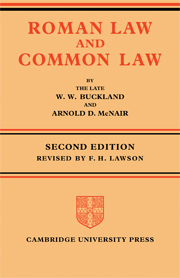Book contents
- Frontmatter
- Contents
- Preface
- Preface to the Second Edition
- Note on the 1965 Impression
- Introduction
- Abbreviations
- Chapter I THE SOURCES
- Chapter II THE LAW OF PERSONS
- Chapter III LAW OF PROPERTY
- Chapter IV LIMITED INTERESTS AND SERVITUDES
- Chapter V UNIVERSAL SUCCESSION
- Chapter VI OBLIGATIONS: GENERAL
- Chapter VII OBLIGATIONS: GENERAL (cont.)
- Chapter VIII PARTICULAR CONTRACTS
- Chapter IX QUASI-CONTRACT AND NEGOTIORUM GESTIO
- Chapter X DELICT AND TORT
- Chapter XI PARTICULAR DELICTS AND TORTS
- Chapter XII PROCEDURE
- Index
Chapter VIII - PARTICULAR CONTRACTS
Published online by Cambridge University Press: 30 March 2010
- Frontmatter
- Contents
- Preface
- Preface to the Second Edition
- Note on the 1965 Impression
- Introduction
- Abbreviations
- Chapter I THE SOURCES
- Chapter II THE LAW OF PERSONS
- Chapter III LAW OF PROPERTY
- Chapter IV LIMITED INTERESTS AND SERVITUDES
- Chapter V UNIVERSAL SUCCESSION
- Chapter VI OBLIGATIONS: GENERAL
- Chapter VII OBLIGATIONS: GENERAL (cont.)
- Chapter VIII PARTICULAR CONTRACTS
- Chapter IX QUASI-CONTRACT AND NEGOTIORUM GESTIO
- Chapter X DELICT AND TORT
- Chapter XI PARTICULAR DELICTS AND TORTS
- Chapter XII PROCEDURE
- Index
Summary
UNILATERAL CONTRACTS IN GENERAL
It has been noted that the Roman contracts break into two groups, those stricti iuris (so called only in later law) and those which gave bonae fidei remedies and may be called bonae fidei contracts, the former group and those alone being purely unilateral.
Unilateral contracts in this sense can hardly be said to exist with us. It is true that a man can make a gratuitous binding promise under seal, but such a thing is unusual and its commonest form, a deed of gift, is often a transfer and not a contract creating an obligation. But it is not to be supposed that the Romans promised something for nothing more readily than we do, and though a number of their contracts were unilateral, it does not follow that the transaction of which they were the expression was also unilateral. Thus mutuum (loan of money and the like) is unilateral; but this is only because till the money is lent there is no contract at all. The most general contract of all, stipulatio, is unilateral, but such a stipulatio will not be a solitary act: in most cases it will be part of a dealing. It may of course be a promise by way of gift. But more usually it will be a promise to pay for some service already rendered (which with us would normally not be binding unless under seal), or given in return for a counterpromise.
- Type
- Chapter
- Information
- Roman Law and Common LawA Comparison in Outline, pp. 271 - 328Publisher: Cambridge University PressPrint publication year: 1952



